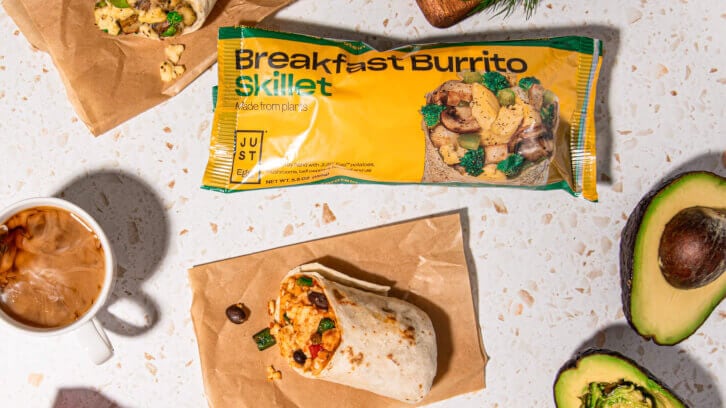US egg replacer brand Eat Just is stirring up the protein category with Just One, a mung bean powder designed for at-home chefs and bakers instead of fitness fanatics.
Just One comes in a 12-ounce aluminum tin and is available in chocolate and peanut butter, maple and banana, and vanilla and chai. The protein powder is available at Whole Foods and online through the plant-based e-commerce platform Purple Carrot.
The canister and powder format is reminiscent of workout powders, but Eat Just is not positioning itself as a supplement, instead focusing on mung bean’s potential for everyday cooking and baking, Josh Tetrick, CEO of Eat Just, explained.
Eat Just reinforces this message with marketing imagery featuring gooey cookies and fluffy pancakes instead of outdoor or workout imagery typical of supplements.
“We want people to make more things with protein. We do not just want people to use it for smoothies. We want people to make cookies and cakes, muffins and pasta and sauces and all sorts of things,” Tetrick elaborated.
“The positioning is really a consequence of what this thing does. And the reason it does so much is because of the protein that we pull out of the mung bean,” Tetrick said. “We pull the protein out in a way that preserves a lot of the functionality, so it can make the egg, but as a result, can make all these other things too,” he added.
‘Everything we sell now is at a positive margin’
Eat Just‘s operational efficiency improved financial metrics and empowered the protein powder expansion, Tetrick said. Eat Just faced a capital crunch in 2023 before an injection of funding from VegInvest/Ahimsa Foundation buoyed the company, as previously reported.
Tetrick signaled Eat Just is in a different position today than two years ago, while not explicitly commenting on the company’s profitability.
“Everything we sell now is at a positive margin, which has not always been the case. We have done a lot of work to drive the cost of protein down, which is the key lever for us to reduce costs and move to a higher margin,” Tetrick said.
Eat Just‘s retail metrics are improving, as consumers buy egg alternatives amid the ongoing avian flu outbreak. Just Egg grew five times faster for the month ending Jan. 26, and 56% of shoppers purchased the egg replacer for a second time, according to Spins data.
“The focus really is continuing to grow month-over-month, continuing to reduce our costs, continuing to expand our points of distribution and retail in food service, and make sure that we really nail this Just One launch,” Tetrick said.
Mung bean’s tariff exposure
Eat Just‘s growth and profitability plans could hit a snag amid increased tariffs and trade tensions. India, China and Thailand produce 38.10%, 21.24% and 21.11% of mung and urd beans (both members of the Vigna family of legume plants), respectively, that the US imports, per USDA data.
The Trump administration’s reciprocal tariff plan – which would have impacted each of these countries – is on pause, though the President floated up to a 145% tariff on China.
“Everything we sell now is at a positive margin, which has not always been the case. We have done a lot of work to drive the cost of protein down, which is the key lever for us to reduce costs and move to a higher margin.”
Josh Tetrick, CEO of Eat Just
The US produces 100,000 acres of mung bean a year, with Oklahoma growing the most per state, according to Iowa State University.
Eat Just buys mung bean quarterly and sources from multiple countries, so the company can work around potential tariffs, Tetrick said. The company has “not sourced beans yet that are impacted by the tariffs,” he added.
“We can source mung beans from Thailand, India, China, ... Mozambique, Kenya, Tanzania and East Africa. And in the case of some countries, in East Africa, the tariffs are actually fairly low – under 15% – whereas in Thailand, they are north of 35%. China, obviously, they are much more than that,” Tetrick elaborated.





